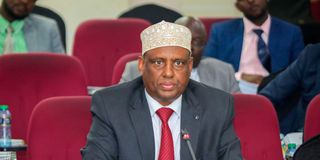Treasury promises counties Sh8bn to fight climate change

Marsabit Governor Ali Mohamud Mohamed at a past event. He says very little has been done by the Kenya Kwanza government to help the Arid and Semi-Arid Lands
What you need to know:
- According to Peter Odhengo, the head of climate financing at Treasury, the funds will be disbursed by the end of this month.
- Mr Odhengo disclosed that the programme, which is pioneered by the Treasury and World Bank, aims at supporting climate resilience by building local capacity to plan, budget, implement and monitor resilience investments.
The National Treasury is set to release Sh7.83 billion from its financial locally-led climate action kitty to counties most impacted by the impacts of climate change. According to Peter Odhengo, the head of climate financing at Treasury, the funds will be disbursed by the end of this month.
Mr Odhengo disclosed that the programme, which is pioneered by the Treasury and World Bank, aims at supporting climate resilience by building local capacity to plan, budget, implement and monitor resilience investments.
“We have already given 45 counties Sh1.1 billion. If Parliament approves the Sh7.83 billion we have in store right now, we can even release it right now but we are sure they are going to do so by December,” said Mr Odhengo at the end of COP28 in Dubai recently.
He said the objective is to empower ASAL counties to enable them to address climate-related problems. Marsabit Governor Mohamud Mohamed however used the global climate stage to ask President William Ruto to make a deliberate effort and prioritise investing in pastoral communities as ASAL regions grapple with floods and other devastating impacts of climate change.
The governor noted that very little has been done by the Kenya Kwanza government to help the Arid and Semi-Arid Lands. “The investment by the national government to us I must say has been very little. We invest in coffee, tea, pyrethrum and other income-generating crops but when it comes to pastoralism, the government has not made an effort,” he said.
“The worst time for us is when it is very dry and our animals die because they lack water. We also lose so much water whenever it rains because we don’t invest in constructing dams since we have scarce resources.” He added: “If the government can construct some large dams in pastoral communities, I think that will help. The government has already pledged to build several dams and if that can be actualised then it will address the climate change crisis in ASAL regions.”
He noted that it will take time before pastoralists embark on diversification and alternative ways of life. “What we need to do is some restocking.”
He clarified that this does not mean the government should compensate everyone who has lost their animals because it would be foolhardy to believe that that can happen.
“What we need is some support so that seed capital can be provided. This will ensure that we have livestock in these areas as we have lost more than 70 per cent of the animals,” said the county boss. “I am grateful to President Ruto as he recently pledged to support us in the line of restocking. As a county, we will do our best and face climate change head-on because it is here with us.”
But according to Janet Ahatho, the director of Environment and Climate Change in Marsabit County, despite having a well-guided policy to use the money, it is not enough. “We came from Marsabit to COP28 to share our experience because 80 per cent of our livelihoods come from pastoralism,” said Ms Ahatho.
“There is no doubt the future of pastoralism is under threat because climate change crisis is a big challenge. “We have, however, put strategies in place with the first one being a policy framework that guides all the adaptation and climate change action. Secondly, we have invested in early warning information systems to reduce losses.”
She added that as a county they are focused and are looking forward to having an early warning information climate center. The director further explained that with the early warning information, they will formulate actions to mitigate against advanced climate change adaptation techniques that will help the communities cope with the crisis that has affected their way of living and denied them their livelihoods.
“We have set our preparedness in motion and have strategically positioned ourselves in terms of the anticipatory actions like how are we going to improve our water systems and structures so that we can respond to water shortages.”





